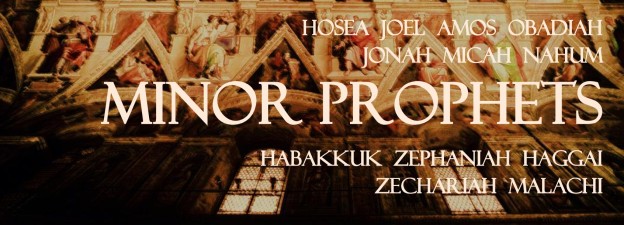"You Are My People" -- Hosea 1:10-3:5
 Wednesday, June 12, 2019 at 01:20PM
Wednesday, June 12, 2019 at 01:20PM 
Sermons on the Minor Prophets: Hosea (3)
YHWH has divorced Israel. The name YHWH gives to Gomer’s third child in Hosea 1:9, is Lo-Ammi. The boy’s name means “not my people.” His name functions as YHWH’s symbolic declaration regarding Israel’s present standing in relationship to the Sinai covenant: cut-off, the covenant rendered null and void. Yet in the very next verse of Hosea (1:10), YHWH announces that Israel will again be “children of the living God.” A dramatic reversal in Israel’s standing occurs as the covenant curse–YHWH’s divorce of Israel–becomes the basis for a future reunion of Israel (both kingdoms). YHWH will again pronounce the covenant promise, “I will be your God and you will be my people.” Those named “no mercy” in the days of Hosea, will be those “who have received mercy,” in the latter days–a people who will seek God, and be restored to the House of David. In this dramatic reversal of divine verdicts, Hosea gives us a lesson in covenant theology, while at the same time pointing us ahead to the messianic age and the coming of Jesus.
This raises the question, how do we go from a rather shocking divine decree of judgment (Lo Ruhmah – “no mercy”) and divorce (Lo-Ammi – “not my people”) to a promise of future redemption from sin and the reconciliation of a divided people? This complete reversal of fortune makes perfect sense against the backdrop of the broad panorama of redemptive history–which is the history of the administration of various biblical covenants, as we have seen throughout our time in the Minor Prophets so far.
There are three covenants revealed to us in the Old Testament. The first is the covenant of works (creation) which YHWH made with Adam in Eden–Adam representing entire human race. Upon condition of perfect personal obedience to YHWH’s commands–“do not eat from this tree”–Adam would have been confirmed in righteousness, and then glorified so as to enter eternal life. But when Adam rebelled against God and sinned, the entire human race (all those represented by Adam) was plunged into the curse of that covenant, sin and death. Hosea will refer to this event in chapter 6:7. The covenant of works demands perfect obedience and issues in death if there is not. It is universal and still in effect today as evidenced by Forest Lawn. We die because of human sin, not because we were designed with a short shelf-life. We die because in Adam, we sinned and are guilty for his act of rebellion (original sin).
The second covenant found in the Old Testament is the covenant of grace, which God establishes immediately after Adam’s Fall. This covenant is not universal, as is the covenant of works. The covenant of grace is made with God’s elect–those who are in Christ. In Genesis 3:15 shortly after Adam sinned, we read the first promise of the gospel. “I will put enmity between you and the woman, and between your offspring and her offspring; he shall bruise your head, and you shall bruise his heel.” This is a prophecy of the coming of Jesus Christ, whose death upon the cross (the bruising of his heel) crushes the head of the serpent (Satan). This covenant is in view in Genesis 17 when God promises Abraham, “I will be your God, and you and your offspring will be my people.” It is reaffirmed a number of times throughout the Old Testament and comes into its fullness in the New Testament as the “new covenant,” ratified through the shed blood of Jesus (as seen in the words of institution of the Lord’s Supper).
Under the covenant of grace, God promises to freely give those who trust his promise, exactly what he demands of us under the covenant of works–a full and perfect payment for the guilt of sin, and perfect obedience to his commandments–a justifying righteousness. In the new covenant, this comes through faith in the person and work of Jesus (the condition of this covenant). This covenant of grace was promised to Adam, ratified with Abraham, reaffirmed to David (specifically the promise of a Messiah, who possesses an everlasting kingdom) and then foretold in the prophets (especially Jeremiah 31:31-34, which foretells of a new covenant). The covenant of grace is grounded in God’s promise to justify all those who renounce their own righteousness and seek Christ’s through faith.
To read the rest of this sermon: Click Here


Reader Comments